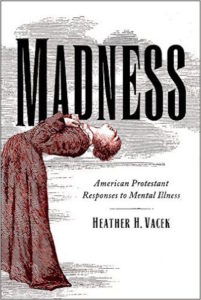 American Protestant Responses to Mental Illness
American Protestant Responses to Mental Illness
Mental illness has always comprised a fundamental component of health, although the overwhelming majority of historical evidence shows little acceptance of and care for affected individuals. In Madness, Heather Vacek follows this trend in the American Protestant church’s response to mental illness through the last three centuries. Rooted in the notion that sickness was a consequence of sin, faith believers avoided association with patients and left them to the care of secular medical professionals.
However, five notable figures stood apart from this idea to reclaim the Christian response to mental illness: colonial clergyman Cotton Mather, Revolutionary-era physician Benjamin Rush, nineteenth-century activist Dorothea Dix, pastor and patient Anton Boisen, and psychiatrist Karl Menninger. Vacek considers these leaders amid the landscape of mass indifference to offer a way forward in the Christian care of patients and overall understanding of mental illness today.
In an excerpt from the book, Vacek writes:
“Human suffering concerned American Christians, but not all shapes of distress earned the same response. Beginning in the colonial era, Protestants professed to care for the well-being of bodies, minds, and souls, but those living with mental illnesses often received minimal attention…
The exploration of Protestants and mental illness demonstrates what appeared – and failed to appear – on congregational agendas. It also offers insight into how Christians engaged suffering, particularly seemingly intractable suffering. Within congregations, sufferers and their families struggled to voice their concerns about mental illness. Many simply remained silent and failed to receive the ministrations of the church. This volume explores why their journeys proved so difficult.”
To read more on this publication, click here.
Fellow travelers are scholars, activists, and practitioners that embody the ideals and commitments of the Project on Lived Theology. We admire their work and are grateful to be walking alongside them in the development and dissemination of Lived Theology.
